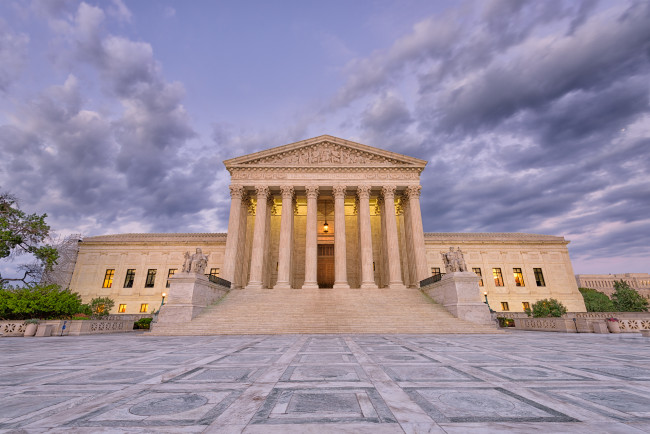-
 Read more
Read moreUpdate January 23, 2023: The Court today dismissed the writ of certiorari as improvidently granted.
----------------------------------------------------------------------------------------------------------------
The Supreme Court’s first oral argument of 2023 involved a grand jury subpoena to a law firm for records related to tax preparation and advice given to a client who wanted to expatriate and was therefore subject to an “exit tax” for departing citizens. The firm refused to produce certain documents, even with statements of legal advice redacted. The district court held the firm in civil contempt, and the firm appealed the contempt order. The Ninth Circuit, in an opinion by Judge Lee, joined by Judges Murgia and Bade, upheld the order, rejecting the law firm’s arguments that the documents were subject to the attorney-client privilege because obtaining or providing legal advice was a significant purpose of the communications.1
-
 Read more
Read moreOriginally published on Law.com’s Corporate Counsel, Zuckerman Spaeder partner Sara Alpert Lawson shares her reflection on generational diversity in the workplace—in the legal industry and beyond. She discusses the effects of technological changes, the value of mentoring and supporting the younger generation of lawyers, and overall, the importance of taking time to understand the shift toward inclusivity and generational differences.
Read the full article here.
-
 Read more
Read moreIn 2010, Congress amended the Anti-Kickback Statute (the “AKS”) to provide that “a claim that includes items or services resulting from a violation of [the AKS] constitutes a false or fraudulent claim” for purposes of the False Claims Act (the “FCA”). 42 U.S.C. § 1320a-7b(g) (emphasis added). Since that amendment, courts have wrestled with the statute’s “resulting from” requirement, and FCA plaintiffs and defendants alike have attempted to interpret the language to their advantage. Recently, the Eighth Circuit weighed in and determined that FCA claims premised on violations of the AKS require relators and the government to show “but-for” causation between alleged kickbacks and submitted claims.
-
 Read more
Read moreExperts are a key part of any complex litigation. Being part of an expert team as an associate can mean taking charge of all the little (but still important) things: shuttling relevant documents to the expert, keeping track of what gets sent so that you have an accurate materials considered list, proofreading and cite checking the expert report, and putting together the final expert package for service. But there are opportunities for associates to make significant substantive contributions when working with experts as well. Below are three ways associates can do that.
-
 Read more
Read moreRemote depositions were once thought to be a short-term solution to one of the many challenges of practicing law in a global pandemic. But considering the efficiencies in time and cost when taking a remote deposition, and attorneys’ increasing comfort with this format, it’s now safe to say that they are here to stay. After more than two years of taking, defending, and facilitating remote depositions, here are five tips for ensuring a smooth experience in the virtual deposition room.
-
 Read more
Read moreAnyone who lives or works in Baltimore, Maryland is familiar with the “squeegee kids.” When stopped at a red light downtown, it’s not uncommon for someone—usually a teenage boy of color—to approach your car with an offer to clean your windshield for money. Most of these interactions are, in my experience, unremarkable. But some find them irritating, and many lament that the squeegee workers’ business model, which involves weaving between cars at busy intersections, is dangerous. Even worse, on rare occasions, hostilities erupt between the squeegee workers and the drivers they encounter. One such encounter earlier this year had tragic and fatal consequences.1
-
 Read more
Read moreWhat happens when the Supreme Court changes the interpretation of the law under which a federal inmate was convicted, such that the person would be innocent under that new interpretation? On November 1, the Supreme Court is set to hear argument in Jones v. Hendrix, 21-857, which asks the Court to resolve a circuit split regarding the scope of 28 U.S.C. § 2255(e). Section 2255(e), the so-called “saving clause,” allows federal inmates to collaterally challenge their convictions through traditional habeas actions under 28 U.S.C. § 2241 where “it appears that the remedy by [§ 2255] motion is inadequate or ineffective to test the legality of [their] detention.” While most courts of appeals allow federal inmates to use the saving clause to bring habeas actions when the law under which they were convicted changes and those changes are retroactive, the Eighth, Tenth, and Eleventh Circuits do not. The particular circumstances of the Jones case may impact the Court’s treatment of the issue.
-
 Read more
Read moreIn government contracting fraud cases with no actual or intended loss, defense attorneys should be on the lookout for prosecution attempts to invoke the “government benefits rule” to estimate “total gain” as an alternative measure of “actual loss.” That method can result in a much higher recommended sentence under § 2B1.1 of the U.S. Sentencing Guidelines (Guidelines). But the prosecution’s position may rest on an outdated version of the Guidelines (U.S.S.G. § 2F1.1 [deleted]) or caselaw decided under that version. More recent decisions suggest that government contracting fraud cases decided under § 2F1.1 are no longer persuasive.
-
 Read more
Read moreThe Supreme Court is scheduled to hear argument on November 8 in Mallory v. Norfolk Southern Railway Co., 21-1168, and it appears ready to resolve a longstanding issue that has divided lower courts. That issue is whether it is constitutional for a state to condition a corporation’s right to do business in the state upon the corporation’s consent to personal jurisdiction in the state’s courts.
-
 Read more
Read moreView the article online: https://www.science.org/doi/10.1126/science.abq4981
By Murray M. Lumpkin, Margaret A. Hamburg, William B. Schultz, Joshua M. SharfsteinDuring the COVID-19 pandemic, scientists at the US Food and Drug Administration (FDA) have reviewed large numbers of pandemic-related tests, medications, and vaccines. However, long-standing confidentiality practices have kept FDA from sharing many of these analyses and the data behind them with the regulatory agencies of other nations, especially those in low- and middle-income countries (LMICs). With FDA not sharing key information, the primary source of dependable COVID-19 product regulatory documentation and information for resource-constrained countries has been the World Health Organization (WHO) in coordination with leading European regulators. These efforts are commendable, but in many cases FDA’s assessments will be some of the most sought after and scientifically robust in the world—and should be shared with the widest possible regulatory audience. FDA must demonstrate similar leadership and commitment to global health by reforming its outdated, restrictive practices on information sharing.
As the regulatory and business environments in which our clients operate grow increasingly complex, we identify and offer perspectives on significant legal developments affecting businesses, organizations, and individuals. Each post aims to address timely issues and trends by evaluating impactful decisions, sharing observations of key enforcement changes, or distilling best practices drawn from experience. InsightZS also features personal interest pieces about the impact of our legal work in our communities and about associate life at Zuckerman Spaeder.
Information provided on InsightZS should not be considered legal advice and expressed views are those of the authors alone. Readers should seek specific legal guidance before acting in any particular circumstance.
Contributing Editors

John J. Connolly
Partner
Email | +1 410.949.1149

Andrew N. Goldfarb
Partner
Email | +1 202.778.1822

Sara Alpert Lawson
Partner
Email | +1 410.949.1181

Nicholas M. DiCarlo
Associate
Email | +1 202.778.1835




